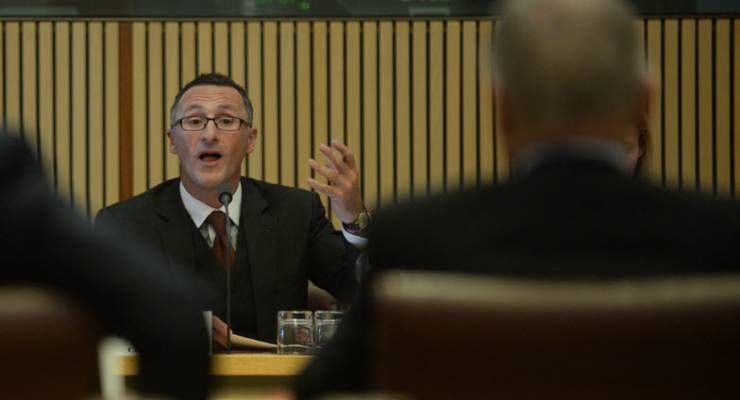
Energy giant Woodside has revealed the details of what corporations receive from political parties for subscribing to party fundraising ventures, in a rare peek inside the fastest growing form of political donation.
For a decade or more, both sides of politics have been working to move corporate donors away from outright donations to subscriptions or membership fees for what are described as “business fora”, which entail larger annual donations for which donors receive access to a suite of events. Because such subscriptions are in exchange for a service from the party, they do not count as donations under Commonwealth electoral laws and do not have to be disclosed. It’s also been rare for the specific services provided by parties to be itemised publicly.
But in response to questions by Greens senator Richard Di Natale, who is chairing a senate committee looking at political influence of donations, Woodside Energy provided a breakdown of what it gets from the major political parties, to whom it pays $110,000 each. In 2016, Woodside decided to end political donations other than these subscriptions, and now advocates greater transparency around all donations.
For its $110,000 subscription to the Liberals’ Australian Business Network this year, Woodside received:
- Two seats at 4 briefings held with Liberal MPs from different states;
- Two seats at nine “boardroom policy forums” covering a range of major policy areas;
- Two seats at the traditional Budget Night dinner in May; and
- Two seats at two “Prime Minister’s Networking Dinners”.
Labor offers more access, understandably given it is out of power and has less sway over policy. For a $110,000 subscription to the Federal Labor Business Forum, Woodside is getting
- Two policy briefing sessions, “designed to address achievements, issues and challenges in key portfolio areas”;
- Tickets to “Leader events” in Perth;
- Four tickets to the traditional Opposition Leader’s Budget Reply dinner in May;
- Two tickets to a two-day conference with Labor shadow ministers, called the Federal Labor Business Exchange Program;
- Five tickets to end-of-year drinks with Bill Shorten; and
- Tickets to “boardroom” events with shadow ministers as they arise.
These federal fundraising bodies are in addition to similar bodies established at state level by the parties, as companies grow increasingly uncomfortable with the scrutiny that political donations bring and perceptions they are aligned with one side or another. According to Woodside executive Michael Abbott, who fronted the inquiry earlier this month, “We’re not in Canberra, we don’t have a person full-time there, we don’t employ lobbyists. So getting our people across there to see the broader political debate and interact with a variety of members from those particular parties, alongside peers and people from other industries, as well, there’s a value to that in having a better understanding of how the process works. But it’s not designed to give us influence on any particular issues that impact upon our business.”








How can donations ever be properly controlled?
It would be like p(l)aying Whack-a-Mole and whatever was prohibited would still occur, just underhandedly.
The only way to ensure some equity in electioneering is to monitor, not the income, but the SPENDING which is plain for all to see, that rather being the point.
It is said that they best way to reduce some activity is to tax it, so we could have a GST of Graft.
This is why the Chinese CCP loves Australia. Our politicians are so cheap. They are so cheap to bribe, compared to a corrupt African politician who wants a few million, they will sell out for tens of thousands, the promise of a job post politics, or thirty pieces of silver.
“Rolex, Mr Macfarlane?”
“Tell me again Daddy. Why do we hate bloody poli-ticks …..?”
Yet still the obsession of the Coalition remains The Unions & overly activist charities. The true cancer on our democracy, however, remains donations from the corporate sector.
Agree Marcus…it seems to have escaped Bernard’s notice that Bill Shorten, and many of his shadow ministers, conduct town-hall meetings all over the country…dozens of them for the ‘ordinary folk’.
Everyone can come along and express their view, ask questions and are not required to pay $110,000 for the opportunity.
What’s wrong with that?????